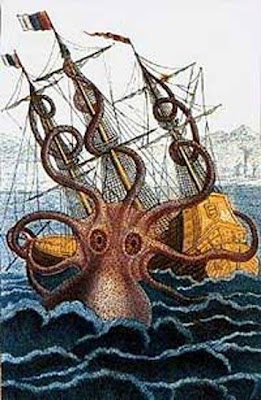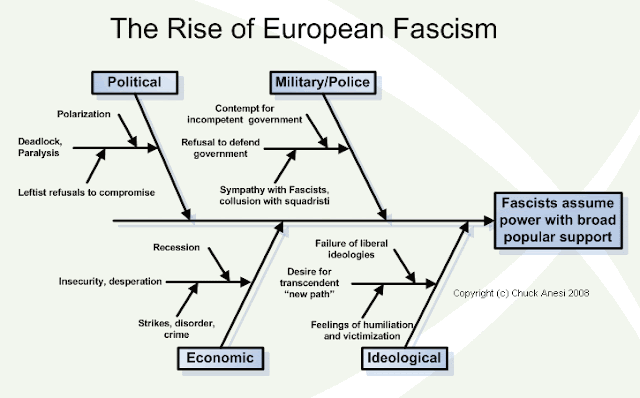"Greece is not an exception. It is one of the main testing grounds for a new socio-economic model of potentially unlimited application: a depoliticised technocracy in which bankers and other experts are allowed to demolish democracy."
Slavoj Žižek
"Corruption is a tree, whose branches are of an immeasurable length: they spread everywhere; and the dew that drops from thence hath infected some chairs and stools of authority."
Beaumont and Fletcher, The Honest Man's Fortune
This is a fascinating perspective on the financial situation in Europe from Slavoj Žižek which appeared in a recent edition of the London Review of Books. It reads like a modern variation of an age old script with dollars and bankers replacing bullets and shock troops, at least for now.
The role of Goldman Sachs and some of the other banks, with their attendant politicians who are in many cases now their direct representatives in the erosion of freedom in Europe, is fascinating to watch, in the manner of a train wreck in slow motion.
The monied interests are putting forward their own agendas and candidates while maintaining the charade of popular government, goose-stepping to the tune of financial expediency and the 'iron law of oligarchy' that helped to spawn the cult of the Übermensch at the beginning of the twentieth century.
The counter example is Iceland, and at an earlier period Sweden, which took a different course of action with their banks, direct confrontation and resolution of crony capitalism and the debt trap, rather than accomodation and appeasement.
The US and UK are little better off, having established a temporary equilibrium in which the monied interests are consolidating their gains. How else can one explain the lack of investigations and prosecutions of financial frauds, that become increasingly blatant and brazen, while the national economy continues to stagnate under the burden of crony capitalism and the most powerful political agenda is more tax cuts and sinecures for the super rich? And freedom continues to be assaulted and deconstructed in the name of the endless war on terror.
At some point the people will make a stand, and the Banks will make them an offer which they think that they cannot refuse. This is playing out now in Greece, and is coming to a country near you.
London Review of Books
Save us from the saviours
By Slavoj Žižek
25 May 2012
Imagine a scene from a dystopian movie that depicts our society in the near future. Uniformed guards patrol half-empty downtown streets at night, on the prowl for immigrants, criminals and vagrants. Those they find are brutalised. What seems like a fanciful Hollywood image is a reality in today’s Greece. At night, black-shirted vigilantes from the Holocaust-denying neo-fascist Golden Dawn movement – which won 7 per cent of the vote in the last round of elections, and had the support, it’s said, of 50 per cent of the Athenian police – have been patrolling the street and beating up all the immigrants they can find: Afghans, Pakistanis, Algerians. So this is how Europe is defended in the spring of 2012...
The prophets of doom are right, but not in the way they intend. Critics of our current democratic arrangements complain that elections don’t offer a true choice: what we get instead is the choice between a centre-right and a centre-left party whose programmes are almost indistinguishable. On 17 June, there will be a real choice: the establishment (New Democracy and Pasok) on one side, Syriza on the other.
And, as is usually the case when a real choice is on offer, the establishment is in a panic: chaos, poverty and violence will follow, they say, if the wrong choice is made. The mere possibility of a Syriza victory is said to have sent ripples of fear through global markets. Ideological prosopopoeia has its day: markets talk as if they were persons, expressing their ‘worry’ at what will happen if the elections fail to produce a government with a mandate to persist with the EU-IMF programme of fiscal austerity and structural reform.
The citizens of Greece have no time to worry about these prospects: they have enough to worry about in their everyday lives, which are becoming miserable to a degree unseen in Europe for decades...
Here is the paradox that sustains the ‘free vote’ in democratic societies: one is free to choose on condition that one makes the right choice. This is why, when the wrong choice is made (as it was when Ireland rejected the EU constitution), the choice is treated as a mistake, and the establishment immediately demands that the ‘democratic’ process be repeated in order that the mistake may be corrected. When George Papandreou, then Greek prime minister, proposed a referendum on the eurozone bailout deal at the end of last year, the referendum itself was rejected as a false choice.
There are two main stories about the Greek crisis in the media: the German-European story (the Greeks are irresponsible, lazy, free-spending, tax-dodging etc, and have to be brought under control and taught financial discipline) and the Greek story (our national sovereignty is threatened by the neoliberal technocracy imposed by Brussels).
When it became impossible to ignore the plight of the Greek people, a third story emerged: the Greeks are now presented as humanitarian victims in need of help, as if a war or natural catastrophe had hit the country. While all three stories are false, the third is arguably the most disgusting. The Greeks are not passive victims: they are at war with the European economic establishment, and what they need is solidarity in their struggle, because it is our struggle too.
Greece is not an exception. It is one of the main testing grounds for a new socio-economic model of potentially unlimited application: a depoliticised technocracy in which bankers and other experts are allowed to demolish democracy. By saving Greece from its so-called saviours, we also save Europe itself.
Read the entire article here.































